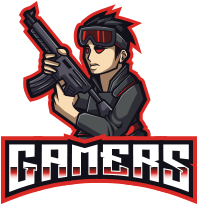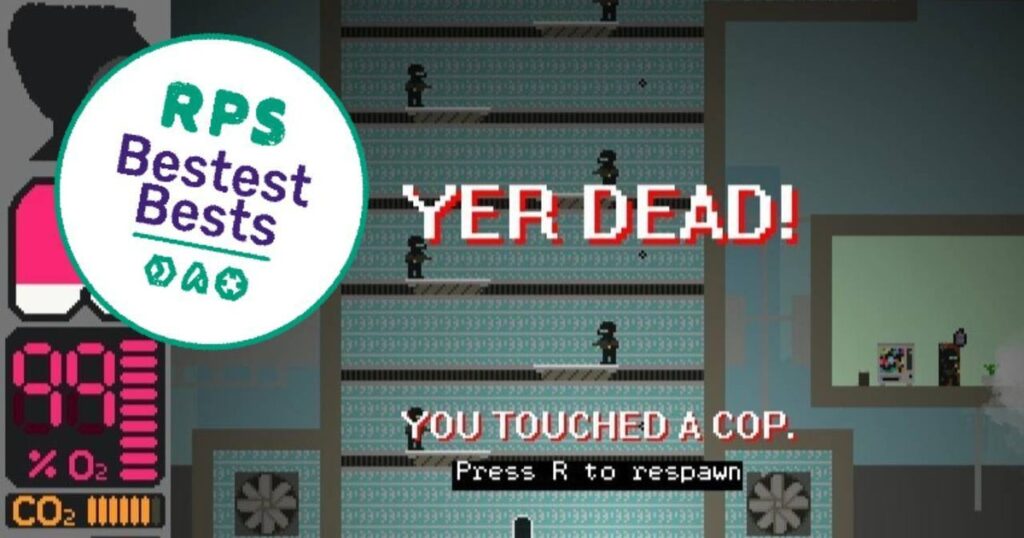When I was a competitive long-distance runner at school, breath control was paramount. We were never really taught this, mind. It was an art you picked up through practice: how to breathe before the race, saturating your blood with O2 without dizzying yourself; when to permit the shorter, emergency breaths and when to apply restraint; when to deepen your inhales and charge yourself up for an attack on a hill.
And then, how to organise your body around your breath, straightening your posture to expand your lungs without tipping back too far and squandering muscle power; how to breath in time with your stride and the movement of your shoulders, so as to firm up your momentum and shave a miraculous-feeling minute off your finishing time. All this, plus various daft psychological war gambits of my own devising. When overtaking or being overtaken, I used to seal my lips shut on that side and breath through the other corner of my mouth, to make it look like I was hardly out of breath at all.
Video games seldom require us to think about breathing, which makes sense given that most of us don’t really think about breathing, most of the time. There are a few in which awareness of your avatar’s lungs is a factor – you’ll hold your breath to steady your scope in Call Of Duty, and feel its absence in the woozy animations of a Souls character who’s out of stamina. But not till the brilliant, buffoonish, aggravating and disturbing Mask Quest have I played a game that de-automates breathing and turns it into a mechanic, a button you must deliberately push and release to fill a cartoon diagram of your character’s chest with air. Fail to do so, and you’ll perish within seconds.
It adds considerable difficulty to a game that is already at the bruising end of the Celestial cosmos, a precision-platformer in which brushing a hazard kills you instantly, a game that challenges you to navigate a dreary fusillade of bullets travelling in opposite directions through a stack of walkways, or survive a labyrinth of ladders while being harassed by a drone. Now, try doing all that while remembering to inhale and exhale. It’s not enough to spam the button: there’s a carbon dioxide gauge beneath the cartoon lungs, and if you empty that out with uncoordinated, rapid breaths you’ll hyperventilate. You have to maintain the drumbeat of your respiration, while synchronising your movements to those of murderous police officers who don’t, seemingly, need to breathe, who appear lifeless and inhuman in their regularity.
As the title may suggest, Mask Quest is a “political” game, but not in the sense of wearing a moral on its sleeve. It’s more of a painstakingly weird exploration of a historical moment than a statement. The Mask you are Questing for is the familiar Covid-era blue-white respirator, and the Quest itself is a journey to different parts of a modern western city, hoping to find a store that still has one in stock. Between the platform challenges, you’ll mingle with groups of people brandishing placards about brutal pandemic restrictions, hedged in by armies of police.
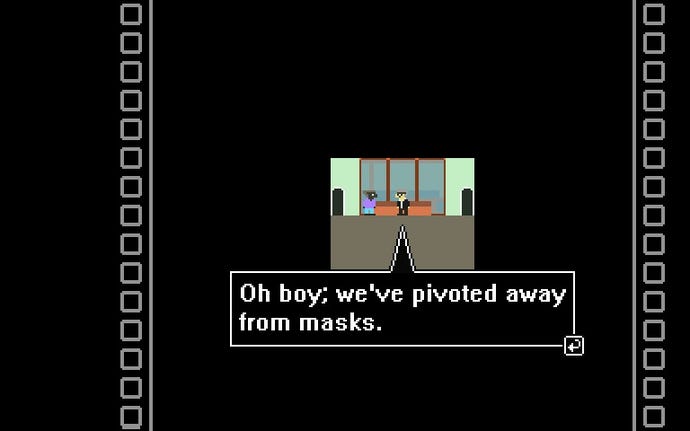
Mask Quest isn’t an argument against protecting yourself from Covid, but in both the premise and the sparse, toilet-graffiti writing, it expresses massive ambivalence about the enforcement of social distancing: how it can be used as a pretext to thwart collective organisation, and above all, how it intersects with discriminatory policing.
It’s a study of systematic racism that appears to take inspiration (originally, another word for inhalation) from specific atrocities. I won’t spell the parallel out, or at least, not any more than I already have, but your character is Black, your enemies are all cops, and the whole game is one giant struggle to breathe. There is also, perhaps, an overlapping investigation of ableism in public spaces, though I don’t want to conflate ableism with racism. Again, the cops don’t seem to respire. In requiring you to do so manually, the game turns breathing into your disability.
Mask Quest really teaches you to hate cops. One of its nastiest touches is the text when you die, which resolutely blames the victim – never “a cop shot you”, but “you got shot”, never “a cop beat you to death”, but “you touched a cop”. Even as it monsters the old bill, however, it also transforms them into toys, reducing them to platform-game props with repetitive behaviours that can be reliably gamed, given immense concentration and persistence.
Some of them come bounding at you yelping yobbishly – time it right, and you can sneak under their leaps. Others stand there shooting monotonously in either direction. Some carry riot shields that function like pachinko bumpers, launching you diagonally and so, allowing you to reach areas you can’t jump to. Some hurl gas grenades that lock you spluttering in place if you try to inhale. Most despicable of all are the drones, which home in like wasps, even when you’re out of view; their movements are a bit ungainly, which occasionally lets you lure them into terrain traps, but also means they’re capable of surprising you.
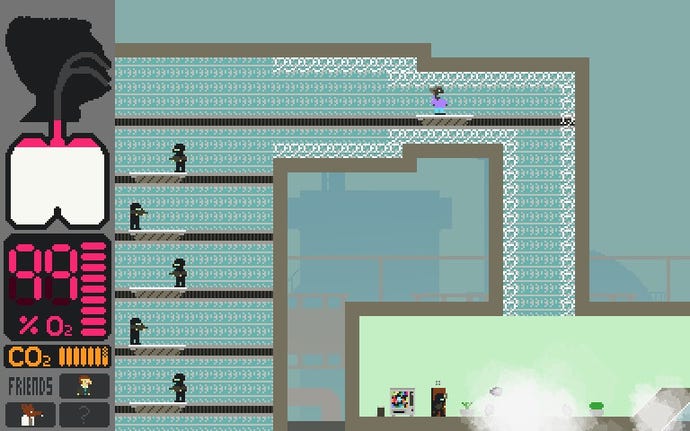
Your only means of fighting back is the air in your lungs. You can blow drones away when exhaling, which might buy you a second to reach safety, but is hardly a dependable strategy. You can also blow on sails to propel boats, including boats crewed by the fuzz. At the game’s most hopeful, there’s the idea of synchronised breathing as a form of resistance, a gathering gale that throws the organs of repression into disarray. As you explore the city, you’ll make friends who can be magically summoned to huff on statues, shattering them and so, luring outraged enforcers away from previously locked areas.
Puffing furiously at drones and statues looks very silly, of course. In general, Mask Quest walks a razor-thin line with its humour. It can be amusing when you fall into water, accidentally inhale and have to spit it all out when you reach ground. There’s a Charlie Chaplin-esque absurdity to doubling over coughing while hopping through tear gas, even as your last few percentage points of oxygenated blood dribble away. The writing is ridiculous: protestors shout things like “no U”. But the scruffy comedy never hides the ugliness. It’s of a piece with the unfairness. You are the butt of every joke.
Visually, the game seems purposefully makeshift, like Canabalt fed through Kid Pix, but the breathing animations and their accompanying vocalisations – personally supplied by co-developer undefdev – are powerful. Your character gapes like Kirby when you hold the button, and you can all but feel the restorative oxygen whistling down their pipes.
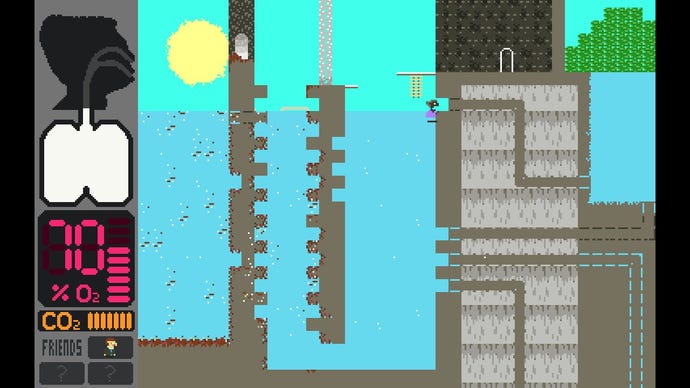
The cleverness of the game’s level design is as double-edged as the humour. It gracefully weaponises and politicises the casual sadism of any game that defines itself as a series of goals and punishments. There are moments, typically during your first few tries at a level, when you marvel at the ingenuity of it all, at how smartly and vindictively the more familiar platforming concepts mesh with the breathing constraint. Later levels are pleasingly abstract, all but discarding the city backdrop. You’ll ride platforms that travel gunfire-fast, obliging you to hop over bullets as you catch up to them. You’ll use those pachinko riot shields to soar over gas clouds and suck in a lungful of sky. There were many moments when I thought of Fez, Braid, and the other indie darlings of the Xbox Live Arcade era.
It makes me wonder – again channelling my memories of cross-country running – about how breathing mechanics might be incorporated into a variety of other games. Or whether there are any existing video game mechanics or routines, like scouting clear space in a bullet hell shooter, that could be productively reconsidered as respiration. But I’m not sure the aim here is really to add another tool to the game design repertoire.
Again, Mask Quest is punitive: I have died hundreds of times while playing it. The one bone it throws you is some extremely generous checkpointing, with rapid reloads, and sometimes this only steepens the failure spirals, as you throw yourself at puzzles that measure victory in pixels. I haven’t sworn aloud and ragequit so often for years, and this feels appropriate to a game that systematises injustice so hilariously, so horribly. The best outcome, perhaps, is that you stop trying to have fun and simply acknowledge that what’s being asked of you is enormously unkind.
